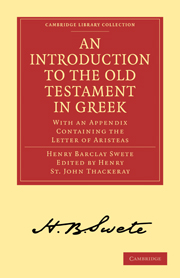Book contents
- Frontmatter
- PREFACE
- Contents
- PART I THE HISTORY OF THE GREEK OLD TESTAMENT AND OF ITS TRANSMISSION
- CHAPTER I The Alexandrian Greek Version
- CHAPTER II Later Greek Versions
- CHAPTER III The Hexapla, and the Hexaplaric and other Recensions of the Septuagint
- CHAPTER IV Ancient Versions based upon the Septuagint
- CHAPTER V Manuscripts of the Septuagint
- CHAPTER VI Printed Texts of the Septuagint
- PART II THE CONTENTS OF THE ALEXANDRIAN OLD TESTAMENT
- PART III LITERARY USE, VALUE, AND TEXTUAL CONDITION OF THE GREEK OLD TESTAMENT
- APPENDIX: THE LETTER OF PSEUDO-ARISTEAS
- INDICES
CHAPTER IV - Ancient Versions based upon the Septuagint
Published online by Cambridge University Press: 05 August 2011
- Frontmatter
- PREFACE
- Contents
- PART I THE HISTORY OF THE GREEK OLD TESTAMENT AND OF ITS TRANSMISSION
- CHAPTER I The Alexandrian Greek Version
- CHAPTER II Later Greek Versions
- CHAPTER III The Hexapla, and the Hexaplaric and other Recensions of the Septuagint
- CHAPTER IV Ancient Versions based upon the Septuagint
- CHAPTER V Manuscripts of the Septuagint
- CHAPTER VI Printed Texts of the Septuagint
- PART II THE CONTENTS OF THE ALEXANDRIAN OLD TESTAMENT
- PART III LITERARY USE, VALUE, AND TEXTUAL CONDITION OF THE GREEK OLD TESTAMENT
- APPENDIX: THE LETTER OF PSEUDO-ARISTEAS
- INDICES
Summary
The Christian Churches of Greek-speaking countries throughout the Empire read the Old Testament in the Alexandrian Version. Few of the provinces were wholly non-Hellenic; Greek was spoken not only in Egypt and Cyrenaica, in Western Syria, Asia Minor, Macedonia, and Achaia, but to a great extent in the West, in Italy and at Rome. Roman satirists of the first century complained that the capital had become a Greek city; the upper classes acquired Greek; the freedmen and slaves in many cases spoke it as their mother tongue. Official letters addressed to the Roman Church or proceeding from her during the first two centuries were written in Greek; only four of the Bishops of Rome during the same period bear Latin names. In Gaul the Greek tongue had spread up the valley of the Rhone from the Greek colony at Marseilles to Vienne and Lyons; the Viennese confessors of a.d. 177 used it in their correspondence both with the Roman Bishops and with their brethren in Asia Minor; the Bishop of Lyons wrote in the same language his great work against the false gnosis of the age. The Old Testament as known to Clement of Rome and Irenaeus of Lyons is substantially the Greek version of the Seventy. To the Church of North Africa, on the other hand, the Greek Bible was a sealed book; for Carthage, colonised from Rome before the capital had been flooded by Greek residents, retained the Latin tongue as the language of common life.
- Type
- Chapter
- Information
- An Introduction to the Old Testament in GreekWith an Appendix Containing the Letter of Aristeas, pp. 87 - 121Publisher: Cambridge University PressPrint publication year: 2010First published in: 1900



